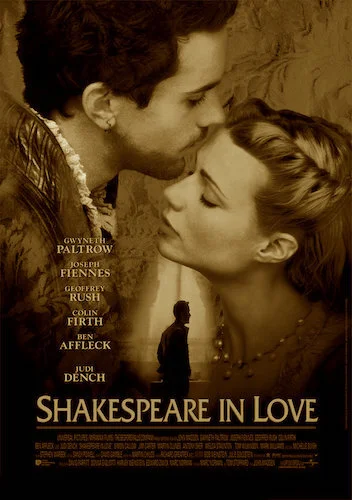Shakespeare in Love
This review is a part of the Best Picture Project: a review of every single Academy Award winner for the Best Picture category. Shakespeare in Love is the seventy first Best Picture winner at the 1998 Academy Awards.
Okay, here goes nothing. While I'm not obsessed with Shakespeare in Love, I'm going to defend it (just days after christening Braveheart one of my least favourite Best Picture winners). I'm sure this will go well. Let's try and forget that this was a major film in the shift of the awards season race strategy, thanks to one particular producer. Let's also try and forget about that producer and his company altogether, for obvious reasons. It'll be hard to avoid, given the track record for Weinstein Company related films from here on out.
Should Shakespeare in Love have won Best Picture? Absolutely not, but here we are. Is it actually that bad of a film? No. It's stuffed with cunning dialogue, a well shaped romance (between William Shakespeare and Viola de Lesseps, which of course never actually happened), and many allusions and tropes to the great playwright that he himself may have loved. As a romantic comedy, Shakespeare in Love has a lot going for it, particularly Lesseps' gender bending subplot as a means of taking part in an art that women were forbidden from back then. Shakespeare was seen as the writer of writers, and one to change the course of the English language (especially with his many invented words). A woman shattering the stage's ridiculous laws is a fantastic counterpoint, to ask how of-the-future Shakespeare really was.
William Shakespeare finds himself wrapped up in a fictional take of his life: one too fantastical for words.
Aside from a couple of annoyances (including that stupid child that has to be the biggest snitch in the history of rom coms, whose name I can't be bothered looking up), Shakespeare in Love is a pleasant film that got caught up in the history of the Academy as the poster movie (and scapegoat) of the new wave of film promotions. Academy Award wins were beginning to feel as disingenuous as ever, with names, logos, money and advertisements being more important than the film (more-so than ever before). I see this as a means of duplicating what Titanic achieved before. Unfortunately, a decent and fun romance with a clever idea as a catalyst is now tainted as the most toxic of Best Picture winners. Folks. It isn't that bad. It's hardly brilliant, but good old fashioned fun should not be chastised this much.
Andreas Babiolakis has a Masters degree in Film and Photography Preservation and Collections Management from Ryerson University, as well as a Bachelors degree in Cinema Studies from York University. His favourite times of year are the Criterion Collection flash sales and the annual Toronto International Film Festival.





